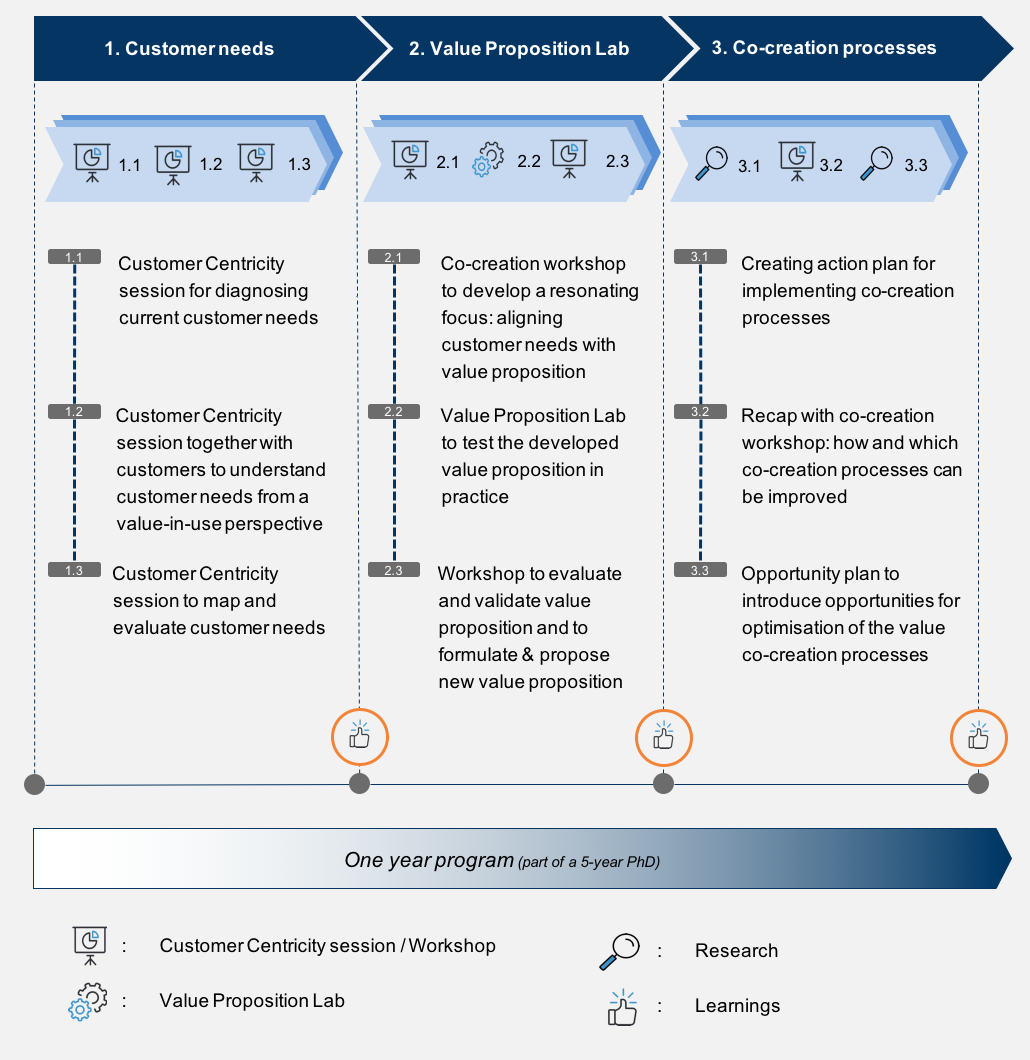Value Proposition Research Program
Be part of a new and revolutionary way of thinking to increase long term business performanceAbout the Value Proposition Research Program
The greatest danger in times of turbulence is not the turbulence: it is to act with yesterday’s logic.
How it all started…
The Value Propositions Research Program (VPRP) is an initiative developed by The Next Organization (TNXTO). The main reason for this initiative is that organisations face challenges to keep up with today’s changing society. Both scholars and practitioners notice that organisations find it hard to understand their customers and how to serve them in the right way through offering strong value propositions. The recently developed marketing paradigms, the Service-Dominant Logic (SDL) and Service Logic (SL), see marketing practices from a different and more holistic point of view. Such a lens can create new (customer) insights for organisations through changing the locus of value creation. Instead of placing the value creation at the firm, customers dominate in value creation. Currently, value can even be “co-created” by customers and organisations. This process of value co-creation can enhance the value experience of customers (how customers experience products or services). How this exactly occurs, remains unclear.
… how it helps organisations…
Elrik Paap & Steije Renes (owners & founders of The Next Organization), and Yasin saw great chances to help organisations facing the above challenges. For this reason, the current research program is established which creates state-of-the-art knowledge that is relevant for both organisations and universities. It helps organisations to solve complex marketing matters like: understanding customer value, identifying customer needs, forming strong value propositions, and co-creating value with customers. The VPRP is designed specifically for organisations interested in keeping up with current’s society and be at the forefront of knowledge development. It aims to make organisations pioneer in marketing, customer centricity and value creation.
… and more about the program.
Together with several companies from different sectors, a consortium is formed. All companies will walk through the one-year research program, which is part of the overall five-year PhD research. Through combining knowledge and expertise from several sectors, organisations participating in this program will benefit from each other. The VPRP consists of three modules, which are further explained below. Each organisation will participate in co-creation workshops, customer centricity sessions and in-depth research. The program helps them on three levels. First, it helps organisations to understand customer needs and customer value from a radical new perspective. Second, it shows how to form strong value propositions and finally, it teaches organisations how to influence and enhance the customers’ value experience through the value co-creation process.

Yasin Sahhar
Consultant & PhD researcher
Yasin is specialised in Strategic Marketing Management; in particular in customer value, value experience, value propositions and value co-creation. With his critical qualitative and interpretative approach, he is involved in several consultancy projects in which he combines practical and academic knowledges and expertise.
Besides that, Yasin is a PhD researcher (in collaboration with the University of Twente (UT), together with Dr. Raymond Loohuis). He specialises himself in the new and revolutionary marketing paradigm: the Service Logic. Yasin conducts research into the core concepts of this paradigm. The focus in his research lies on how organisations can influence and enhance the customers’ value experience through co-creating value with customers in every step of the Customer Journey. The aim of this research is to develop a framework that help organisations how to co-create value which increases long-term business performance.
Initiated by:


Outline of the program
The VPRP is an innovative research program that increases long term business performance through continuously aligning the firm’s offering with customer’s needs. Value co-creation enhances the customers’ value experience in every step of the Customer Journey.
In today’s society, business environments are increasingly turbulent. Consequently, organisations are challenged to manoeuvre properly in their business contexts. The challenge in this for organisations is to understand continuously changing customer needs and how to align their offering with these changing needs. It seems that engaging the customer in the value creation process and initiating effective value co-creation processes becomes more relevant and critical in order to fulfil customer needs and enhance the value experience of customers.
The new and revolutionary perspective, the Service Logic (SL) – views marketing in a broader sense where customers and service are the central focus. The SL puts the customer, instead of the provider, central in the value creation process. So, we move towards the concept of ‘value-in-use’. This shift implies that value is created by customers during the usage processes of products or services. Looking at value through this lens leads to new and more in-depth customer insights. Therefore, organisations are better able to understand the customer (value) experience. The SL urges organisations to think how to facilitate customers as best as possible. Also, organisations have the opportunity to co-create value with their customers. This value co-creation process allows organisations to become involved in customers’ processes and through this, enhance the value experience of customers.
This research program focuses on these concepts and on the integration of these concepts. In other words, the main challenge we face is how organisation can enhance the customer’s value experience through the value co-creation process. Together with industry leading companies, we aim to deliver a framework that focuses on overcoming this challenge.
Each company will follow the one year research program, specifically tailored to their needs. The program consists of three different modules. Each module consists of workshops and in-depth research, as shown in the figure to the right. At the end of each module, a specific learning report will be delivered showing the findings and take-aways. Each individual company that finishes the one year program receives a final report specifically made for them. The VPRP finishes with a best practice report with the final framework where knowledge is integrated from different industries.
Insights from practical cases
What milkshakes van learn us about true value
Illustrating an example of McDonalds
Spotify dynamically fulfils customers’ needs
Illustrating an example of a dynamic value proposition at Spotify
Spotify offers a dynamic value proposition that fit each of their users’ needs. Whether you are fan of rock music or are fond of hip-hop, Spotify offers you all. Spotify brings music in people’s life through easy access (on-the-go on your smartphone or on your desktop) and with great convenience.
If a user is in the mood for classical music, Spotify is able to offer this. On the other hand, when a user is more into electronic dance music, Spotify is able to fulfil the user’s needs too. Also, it proactively provides alternative types of (fitting) music.
DHL developed the Parcelcopter through co-creation with customers
Illustrating an example of value co-creation at DHL
DHL tackles the challenge of improving their supply chain and logistics through hosting international hands-on workshops with customers. A total of 6000 loyal DHL customers participated in these workshops to co-create solutions that enhance the customer experience.
The Parcelcopter is an example of such a solution that has been co-created with customers. It provides customers with significantly faster mail delivery: where standard mail delivery typically takes about 30 minutes, the Parcelcopter only needs eight minutes.
LEGO co-creates new ideas with customers on their online community through co-creation with customers
Illustrating an example of value co-creation at LEGO
Tesla constantly keeps in touch with their customers and adapts their service solutions possibly through co-creation
Illustrating an example of the Service Logic at Tesla. Note: there is not one ‘best-practice’ in the Service Logic.
Tesla is an example that integrates the three core concepts of the Service Logic. Through state-of-the-art technology, Tesla keeps constantly in touch with their customers in their daily life while using the car. If customer needs change, Tesla adapts their services tailored to specific customer needs.
Tesla created a platform that they use to stay in constant contact with their customers and through this co-create new service solutions that resonate with customers’ needs.
Articles
Radically Reassessing The Value Of Offerings
Business contexts and customer needs are constantly changing. In order stay competitive and successful, it is a must for companies to become customer and service oriented. Still, companies face challenges how to cope with changing customer needs. The Next Organization...
Value In The Experience: The Next Source For Compelling Value Propositions
Customer value is seen as the major source of competitive advantage. Organisations constantly explore to create an enhanced understanding of the holistic value creation process. In order to fully comprehend this concept, that is difficult to grasp, organisations...
The Paradox of Value Experience and Value Creation: Both a Pitfall and Opportunity for Organisations
It is crucially important for organisations to understand their customers in order to form strong value propositions. These value propositions can be seen as ‘offerings’. Customers are able to create value (known as value-in-use) through using these offerings in their...



